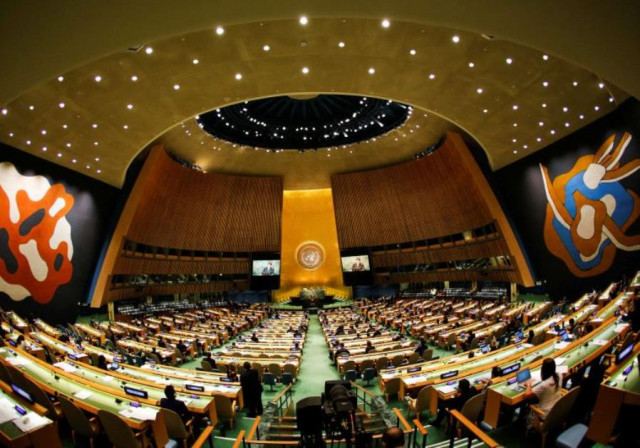Uniting the world against terrorism
The world needs to unite to deprive violent extremists of the fuel they need to spread their hateful ideologies

UN General Assembly. PHOTO: REUTERS
Our response needs to be equally agile and multifaceted. That is why I am convening the first-ever UN High-level Conference on Counter-Terrorism this week in New York. Heads of national counter-terrorism agencies and representatives from international institutions and civil society will discuss how to improve international cooperation and build new partnerships.
The conference will focus on four key areas. First, it will consider how governments, security agencies and law-enforcement bodies can improve the exchange of critical information and strategies to detect, disrupt and prosecute terrorist networks. Second, the conference will discuss how the UN can do more to assist countries around the world affected by terrorism.
Third, it will address the threat posed by foreign terrorist fighters. With the military defeat of ISIL in Syria and Iraq and large numbers of these militants relocating to other conflicted areas or returning home.
Fourth, I intend the conference to focus on how we can prevent terrorism and violent extremism. Improved security will never be enough.
Terrorism is a transnational threat that cannot be defeated by any single government or organisation. It needs a concerted multilateral response at global, regional and national levels. It is essential to strengthen counter-terrorism structures and institutions. But we must also address root causes by promoting education, tackling youth unemployment and addressing marginalisation. That means engaging with local communities, religious organisations and the media. Civil society is central to the conference and our broader counter-terrorism strategies.
Clearly, the response to terrorism and violent extremism must respect human rights and comply with international law. That is not just a question of justice, but of effectiveness. When counter-terrorist policies are used to suppress peaceful protests and legitimate opposition movements, shut down debate, target human-rights defenders or stigmatise minorities, they fail and we all lose. Indeed, such responses may cause further resentment and instability, and contribute to radicalisation.
No cause or grievance can justify terrorism. But we will only diminish the threat by ending the conflicts, human rights abuses, poverty and exclusion that drive so many to violent extremism. Most new recruits to terrorism are between 17 and 27 years old. We must offer them better prospects, economically and socially. And we must reverse the polarisation, xenophobia and hate speech that are proliferating around the world.
Let us also remember the tens of thousands of people killed, wounded and traumatised by terrorism. We must also support the survivors in seeking justice and rebuilding their lives while learning from their experiences.
Finally, terrorism and violent extremism have a profound gender dimension. Terrorists continue to violate the rights of women and girls. Involvement in domestic abuse is a common thread among many perpetrators. That is why we must urgently prioritise the rights, participation and leadership of women.
The international community has come a long way in its efforts to counter terrorism. There is a clear international framework that makes it easier to prosecute terrorists, disrupt their financial networks and prevent online radicalisation. But there is much still to be done.
Our responsibility is to unite to build a world of peace and security, dignity and opportunity for all people, everywhere, so we can deprive the violent extremists of the fuel they need to spread their hateful ideologies.
Published in The Express Tribune, June 28th, 2018.
Like Opinion & Editorial on Facebook, follow @ETOpEd on Twitter to receive all updates on all our daily pieces.















COMMENTS
Comments are moderated and generally will be posted if they are on-topic and not abusive.
For more information, please see our Comments FAQ